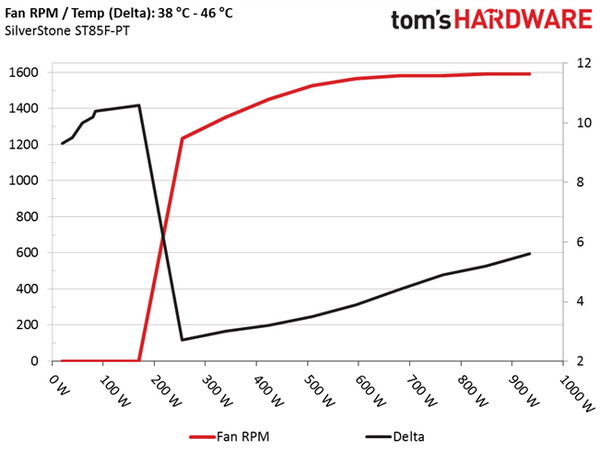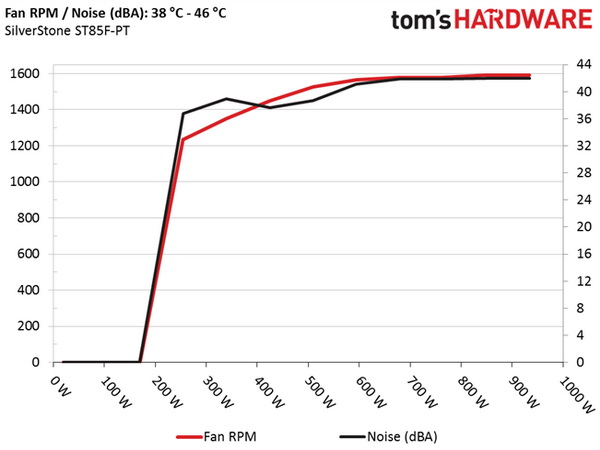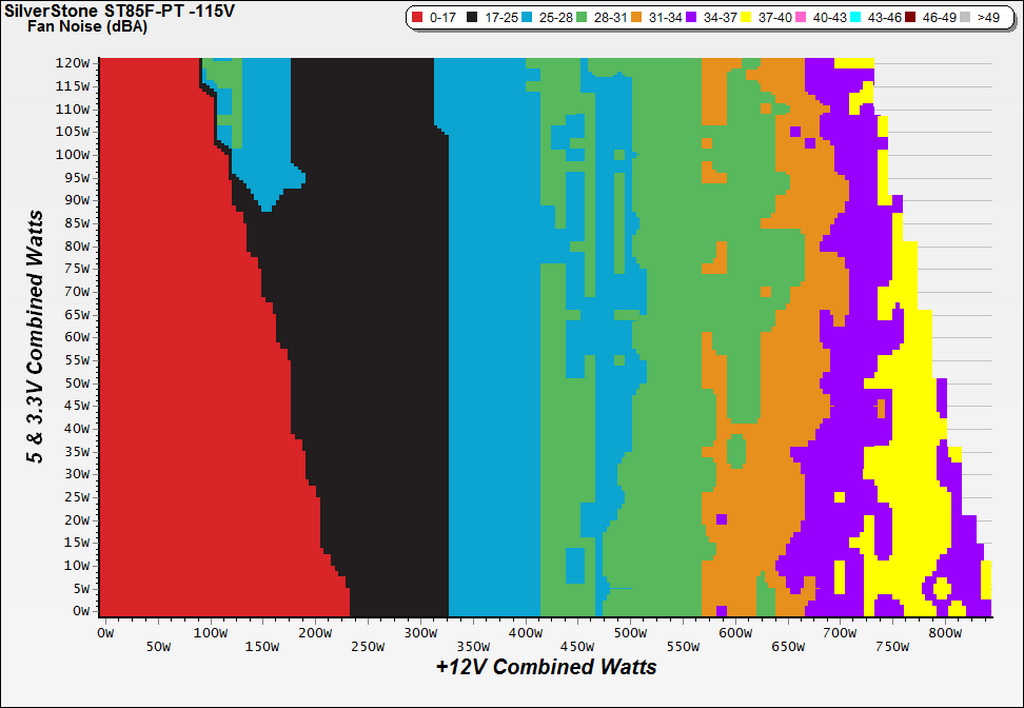SilverStone Strider Platinum ST85F-PT PSU Review
SilverStone's Strider Platinum series offers compact dimensions along with Platinum efficiency and a fully modular cable design. The 850W member of this line will be evaluated today. Its strong card against the competition is the 471W power density score.
Why you can trust Tom's Hardware
Efficiency, Temperature And Noise
Efficiency
Our efficiency testing procedure is detailed here.
Using the results from the previous page, we plotted a chart showing the ST85F-PT's efficiency at low loads, and loads from 10 to 110 percent of its maximum-rated capacity.
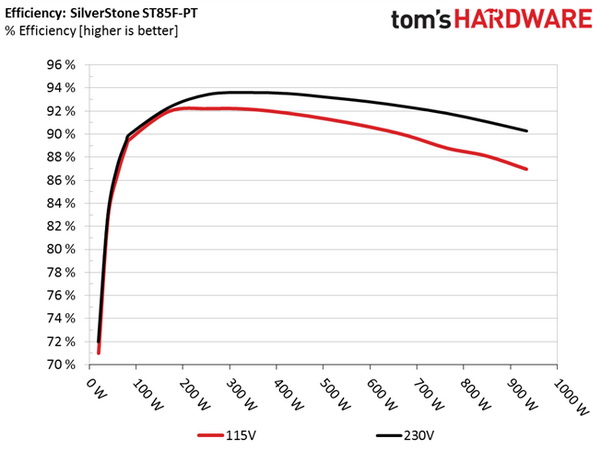
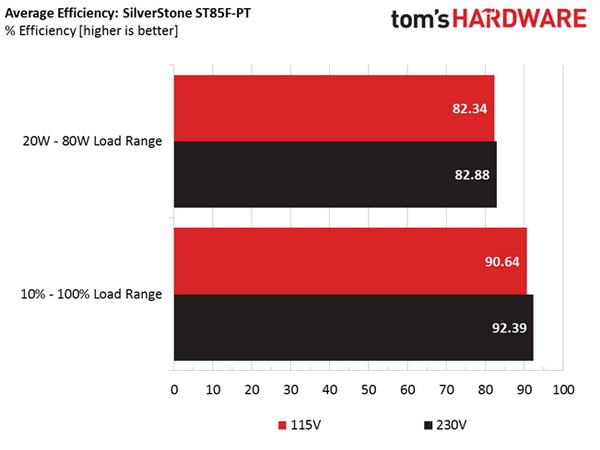
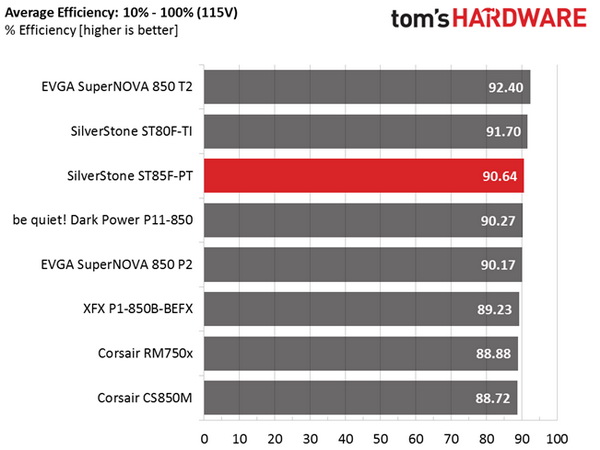
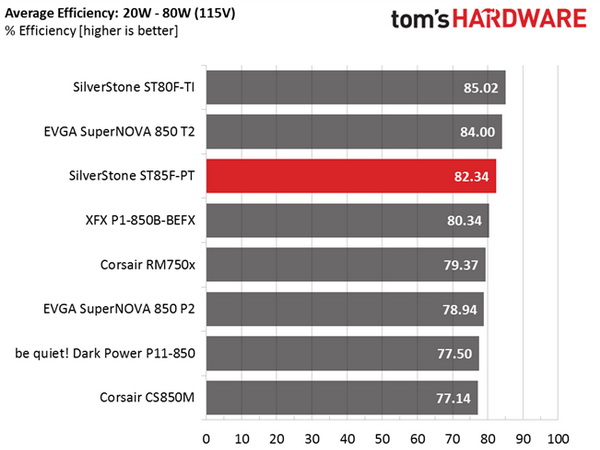
This platform's efficiency is high, even for 80 PLUS Platinum standards. The ST85F-PT manages to leave behind Super Flower's excellent Leadex design, which is utilized by EVGA's 850 P2.
Efficiency At Low Loads
In the following tests, we measure the ST85F-PT's efficiency at loads significantly lower than 10 percent of its maximum capacity (the lowest load the 80 PLUS standard measures). The loads we dialed were 20, 40, 60 and 80 W. This is important for representing when a PC is idle, with power-saving features turned on.
| Test # | 12V | 5V | 3.3V | 5VSB | DC/AC (Watts) | Efficiency | Fan Speed | Fan Noise | PF/AC Volts |
|---|---|---|---|---|---|---|---|---|---|
| 1 | 1.184A | 0.482A | 0.472A | 0.195A | 19.57 | 70.98% | 0 RPM | 0 dB(A) | 0.857 |
| 12.266V | 5.104V | 3.372V | 5.098V | 27.57 | 115.1V | ||||
| 2 | 2.402A | 0.978A | 0.977A | 0.390A | 39.72 | 82.80% | 0 RPM | 0 dB(A) | 0.935 |
| 12.263V | 5.102V | 3.368V | 5.092V | 47.97 | 115.1V | ||||
| 3 | 3.620A | 1.466A | 1.484A | 5.084A | 59.83 | 86.50% | 0 RPM | 0 dB(A) | 0.959 |
| 12.260V | 5.098V | 3.366V | 5.084V | 69.17 | 115.1V | ||||
| 4 | 4.825A | 1.964A | 1.959A | 0.785A | 79.72 | 89.09% | 0 RPM | 0 dB(A) | 0.973 |
| 12.256V | 5.096V | 3.363V | 5.077V | 89.48 | 115.1V |
Under light loads the fan is deactivated and the registered efficiency is very high.
5VSB Efficiency
The ATX specification states that 5VSB standby supply efficiency should be as high as possible, recommending 50 percent or higher with 100 mA of load, 60 percent or higher with 250 mA of load, and 70 percent or higher with 1 A or more of load.
We take four measurements: one each at 100, 250 and 1000 mA, and one with the full load the 5VSB rail can handle.
Get Tom's Hardware's best news and in-depth reviews, straight to your inbox.
| Test # | 5VSB | DC/AC (Watts) | Efficiency | PF/AC Volts |
|---|---|---|---|---|
| 1 | 0.101A | 0.52 | 75.36% | 0.096 |
| 5.120V | 0.69 | 115.2V | ||
| 2 | 0.251A | 1.28 | 78.53% | 0.188 |
| 5.115V | 1.63 | 115.2V | ||
| 3 | 1.001A | 5.09 | 81.83% | 0.318 |
| 5.085V | 6.22 | 115.2V | ||
| 4 | 3.001A | 15.02 | 78.93% | 0.381 |
| 5.005V | 19.03 | 115.2V |
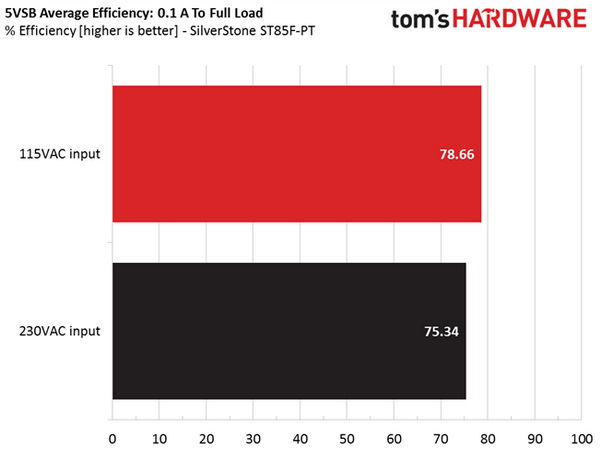
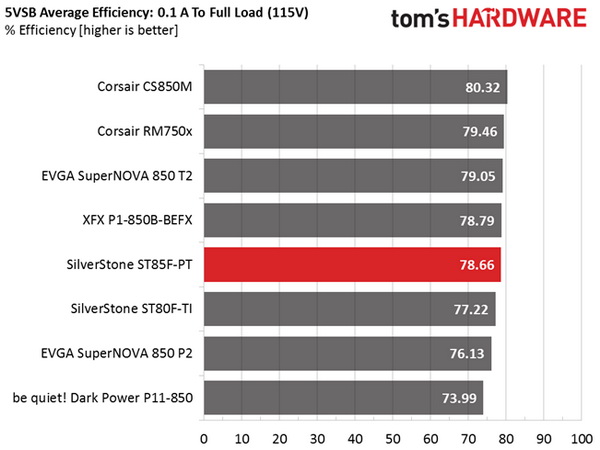
The 5VSB rail demonstrates satisfactory efficiency, which is in line with the competition.
Power Consumption In Idle And Standby
In the table below, you'll find the power consumption and voltage values of all rails (except -12V) when the PSU is idle (powered on, but without any load on its rails), and the power consumption when the PSU is in standby mode (without any load, at 5VSB).
| Mode | 12V | 5V | 3.3V | 5VSB | Watts | PF/AC Volts |
|---|---|---|---|---|---|---|
| Idle | 12.266V | 5.108V | 3.375V | 5.107V | 7.74 | 0.510 |
| 115.2V | ||||||
| Standby | 0.09 | 0.014 | ||||
| 115.2V |
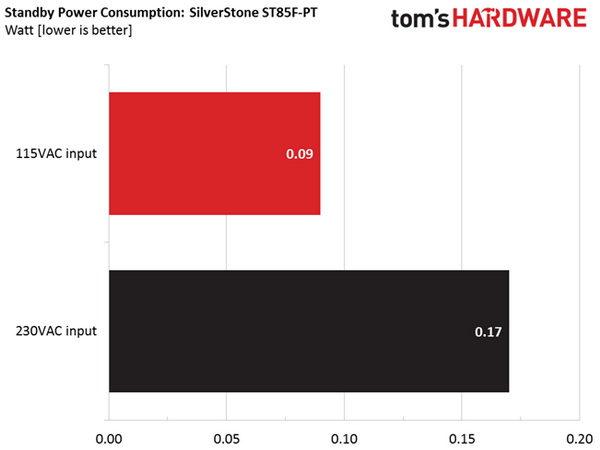
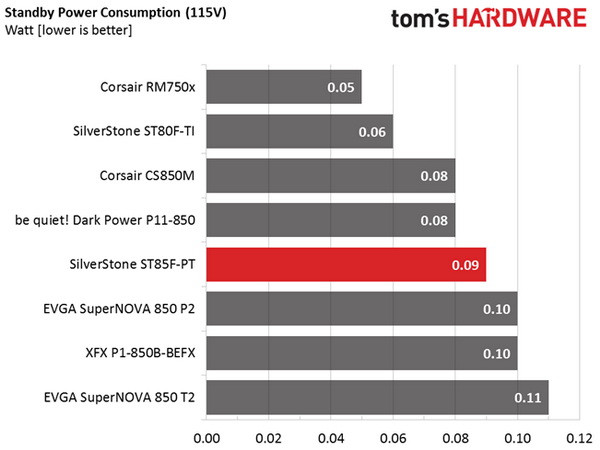
Power consumption in standby mode is kept low enough.
Fan RPM, Delta Temperature, And Output Noise
Our mixed noise testing is described in detail here.
The first chart below illustrates the cooling fan's speed (in RPM), and the delta between input and output temperature. The results were obtained at 38 °C (100.4 °F) to 45 °C (114.8 °F) ambient temperature.
The next chart shows the cooling fan's speed (again, in RPM) and output noise. We measured acoustics from one meter away, inside a small, custom-made anechoic chamber with internals completely covered in sound-proofing material (be quiet! Noise Absorber kit). Background noise inside the chamber was below 18 dB(A) during testing, and the results were obtained with the PSU operating at 38 °C (100.4 °F) to 45 °C (114.8 °F) ambient temperature.
The following graph illustrates the fan's output noise over the PSU's operating range. The same conditions of the above graph apply to our measurements, though the ambient temperature was between at 28 °C (82.4 °F) to 30 °C (86 °F).
SilverStone's semi-passive mode lasts long enough if you don't push the minor rails hard. Once you do, the fan spins slowly, so at least the noise output isn't annoying. At around 580 W and higher, the noise exceeds 31 dB(A). Even in a worst-case scenario, though, it stays below 40 dB(A). As you can see, the fan's profile is quite relaxed under normal operating temperatures.
Current page: Efficiency, Temperature And Noise
Prev Page Load Regulation, Hold-Up Time, And Inrush Current Next Page Protection Features, Evaluated
Aris Mpitziopoulos is a contributing editor at Tom's Hardware, covering PSUs.
-
panathas I don't understand, first you said: "On the other hand, it doesn't have an issue with inaccurate power-good signals that last longer than the corresponding hold-up time" and your last words were: "It is a great shame though that it is affected by the inaccurate power good signal disease". Which one is true? Also in the CONS section you only mentioned the Hold-up time and not the power good signal.Reply -
turkey3_scratch Reply18699506 said:I don't understand, first you said: "On the other hand, it doesn't have an issue with inaccurate power-good signals that last longer than the corresponding hold-up time" and your last words were: "It is a great shame though that it is affected by the inaccurate power good signal disease". Which one is true? Also in the CONS section you only mentioned the Hold-up time and not the power good signal.
First one must have been an mistake since it does drop the PWR_OK after the voltages are already out of spec. -
Aris_Mp Yes something was way out in this phrase. It is fixed now.Reply
This PSU is affected by a fake power good signal, which usually is the case in Sirfa's platform.
In the cons section. Sometimes I don't mention the fake power good signal, when the hold-up time is already too low. But I will make sure that I do from now on. -
Virtual_Singularity ty for the review. So, I know it's kind of not really adequate for comparison considering the watt difference. But, looking at the performance of that last Lian Li sfx reviewed, and this thing, still must say that LL didn't do so badly, though they could really help things if they extended that warranty by at least a year or more.Reply -
Co BIY I think the exterior photos need something for scale. Full-size black boxes and tiny high efficiency black boxes look the same size on a screen without something for scale.Reply
No comment on vacant modular socket plugs. First time I've seen that. Also the copper bars aren't a feature I've seen commented on before.
